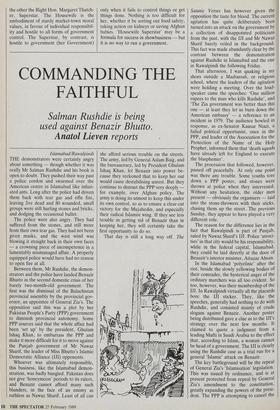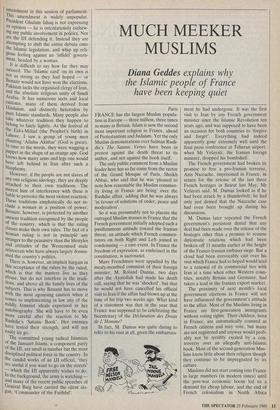COMMANDING THE FAITHFUL
Salman Rushdie is being used against Benazir Bhutto.
Anatol Lieven reports IslamabadlRawalpindi THE demonstrators were certainly angry about something — though whether it was really Mr Salman Rushdie and his book is open to doubt. They pushed their way past a police cordon and swarmed over the American centre in Islamabad like infuri- ated ants. Long after the police had driven them back with tear gas and rifle fire, leaving five dead and 80 wounded, small groups were still hurling stones and bricks, and dodging the occasional bullet.
The police were also angry. They had suffered from the stones, and still more from their own tear gas. They had not been given masks, and the west • wind was blowing it straight back in their own faces — a crowning piece of incompetence in a lamentably mismanaged affair. A properly equipped police would have had no reason to open fire at all.
Between them, Mr Rushdie, the demon- strators and the police have landed Benazir Bhutto in the second domestic crisis of her barely two-month-old government. The first was the dismissal of the Baluchistan provincial assembly by the provincial gov- ernor, an appointee of General Zia's. The opposition said this was a plot by her Pakistan People's Party (PPP) government to diminish provincial autonomy. Some PPP sources said that the whole affair had been 'set up' by the president, Ghulam Ishaq Khan, to embarrass the PPP and make it more difficult for it to move against the Punjab government of Mr Nawaz Sharif, the leader of Miss Bhutto's Islamic Democratic Alliance (IJI) opponents.
Whoever was ultimately responsible, this business, like the Islamabad demon- stration, was badly bungled. Pakistan does not give `honeymoon' periods to its rulers, and Benazir cannot afford many such blunders, in the face of an enemy as ruthless as Nawaz Sharif. Least of all can she afford serious trouble on the streets. The army, led by General Aslam Baig, and the bureaucracy, led by President Ghulam Ishaq Khan, let Benazir into power be- cause they reckoned that to keep her out would cause destabilising unrest. But they continue to distrust the PPP very deeply for example, over Afghan policy. The army is doing its utmost to keep this under its own control, so as to ensure a clear-cut victory for the Mujahedin, and especially their radical Islamist wing. If they see less trouble in getting rid of Benazir than in keeping her, they will certainly take the first opportunity to do so.
That day is still a long way off. The Satanic Verses has however given the opposition the taste for blood. The current agitation has quite deliberately been turned into an attack on the government by a collection of disappointed politicians from the past, with the IJI and Mr Nawaz Sharif barely veiled in the background. This fact was made abundantly clear by the contrast between the demonstration against Rushdie in Islamabad and the one in Rawalpindi the following Friday.
That afternoon, I was quaking in my shoes outside a Madrassah, or religious school, where the leaders of the agitation were holding a meeting. Over the loud- speaker came the speeches: 'One million rupees to the man who kills Rushdie', and `The Zia government was better than this one — at least they let us burn down the American embassy' — a reference to an incident in 1979. The audience howled in response, as ex-Senator Kausar Niazi, a failed political opportunist, once in the PPP, and leader of the Association for the Protection of the Name of the Holy Prophet, informed them that 'death squads have already left for England to execute the blasphemer'.
The procession that followed, however, passed off peacefully. At only one point was there any trouble. Some youths tore down a PPP poster, and stones were thrown at police when they intervened. Without any hesitation, the older men present — obviously the organisers — laid into the stone-throwers with their sticks, chasing them up the street. The previous Sunday, they appear to have played a very different role.
The reason for the difference lies in the fact that Rawalpindi is part of Punjab, ruled by Nawaz Sharif's IJI. Police 'atroci- ties' in that city would be his responsibility, while in the federal capital, Islamabad, they could be laid directly at the door of Benazir's interior minister, Aitazaz Ahsan.
In the Islamabad 'polyclinic' after the riot, beside the slowly yellowing bodies of their comrades, the hysterical anger of the ordinary marchers was all too evident. So too, however, was their membership of the IJI. In Rawalpindi virtually all the placards bore the IJI sticker. They, like the speeches, generally had nothing to do with Rushdie, and consisted mainly of crude slogans against Benazir. Another poster being distributed gave a clue as to the IJI's strategy over the next few months. It claimed to quote a judgment from a leading Mufti in Saudi Arabia to the effect that, according to Islam, a woman cannot be head of a government. The IJI is clearly using the Rushdie case as a trial run for a general 'Islamic' attack on Benazir. The key battleground will be the repeal of General Zia's Islamisation' legislation. This was issued by ordinance, and is at present protected from repeal by General Zia's amendment to the constitution, greatly expanding the powers of the presi- dent. The PPP is attempting to cancel the amendment in this session of parliament. This amendment is widely unpopular. President Ghulam Ishaq is not expressing an opinion — he is ostentatiously eschew- ing any public involvement in politics. Nor are the IJI defending it. Instead they are attempting to shift the entire debate onto the Islamic legislation, and whip up reli- gious feeling against an 'infidel' govern- ment, headed by a woman. h is difficult to say how far they may succeed. The 'Islamic card' on its own is not as strong as they had hoped — or Benazir would not have won the elections. Pakistan lacks the organised clergy of Iran, and the absolute religious unity of Saudi Arabia. It has numerous sects and local customs, many of them derived from Hinduism, and distinctly heterodox by pure Islamic standards. Many people also take whatever tradition they happen to belong to fairly lightly. At the festival of the Eid-i-Millad (the Prophet's birth) in Lahore, I saw a group of young men chanting 'Allahu Akhbar' (God is great). In time to the words, they were wagging a Puppet in the shape of an orange ape. God knows how many arms and legs one would have left behind in Iran after such a blasphemy. However, if the people are not slaves of any one religious ideology, they are deeply attached to their own traditions. The Merest hint of interference with these is liable to provoke the most violent reaction. These traditions emphatically do not in- clude a woman in a position of power. Benazir, however, is protected by another ancient tradition recognised by the people of the country, which is that the ruling classes make their own rules. The fact of a woman ruling is not in principle any stranger to the peasantry than the lifestyles and attitudes of the Westernised male aristocrats who have always largely domin- ated the country's politics. There is, however, an implicit bargain in this acceptance of the rulers by the ruled, which is that the masters live as they Please, but do not interfere in the tradi- tions, and above all the family lives of the subjects. This is why Benazir has to move with the most agonising caution when it comes to implementing in law any of the mildly feminist ideals expressed in her autobiography. She will have to be even more careful after the reaction to Mr Rushdie's 'Satanic Book'. Her enemies have tested their strength, and will not easily let go. The committed young radical Islamists of the Jamaart Islami, a component party of the IJI, are small in number but the most disciplined political force in the country. In the candid works of an IJI official, 'they are useful if you want to go on the streets' — which the IJI apparently wishes to do. In the background, the army is watching— and many of the recent public speeches of General Baig have carried the silent slo- gan, `Commander of the Faithful'.

















































 Previous page
Previous page